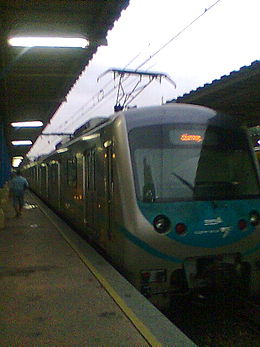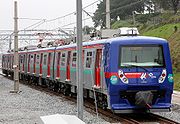- SuperVia
-
SuperVia Trens Urbanos 
Info Locale Greater Rio de Janeiro Transit type Commuter Rail Number of lines 8 Number of stations 98 Daily ridership 540,558 (2009) Operation Began operation November 1, 1998 Operator(s) SuperVia Concessionária de Transportes Ferroviários Technical SuperVia is a Brazilian train operator founded in Rio de Janeiro in November 1998. It carries around 126 million passengers a year on a railroad network comprising 89 stations in 11 cities: Rio de Janeiro, Duque de Caxias, Nova Iguaçu, Nilópolis, Mesquita, Queimados, São João de Meriti, Belford Roxo, Japeri, Paracambi, and Magé.
The baggage areas of SuperVia trains was an adaptation of the original design to fit the Brazilian reality. A Brazilian study found that the average passenger carries a weight of 7 kg in backpacks, shopping bags or briefcases in their daily commute.[1]
Contents
History
In 1998, a concession agreement commenced, which established the concessionaire's investment commitments (SuperVia) and grantor (State). Thus, it was possible to realise savings for the state coffers of more than US$ 1.6 billion, a figure corresponding to the subsidies that the state failed to spend with the operation of the system in the period 1998/2009.
The result of these investments can be demonstrated by the increased number of passengers carried and the significant improvement in compliance with the scheduling of trains, which are monitored on an ongoing basis by the Government, through the regulatory agency.
In 1998, before the grant, 145,000 passengers were transported per day, with a punctuality of less than 30%. In 2009, over 510,000 passengers were transported per day, with an average punctuality of 90%, the highest rate ever recorded in the history of the system.[2]
Modernization
With the arrival of 30 new trains in 2011, 14 previous SuperVia train configurations will be withdrawn from circulation. Capable of carrying 1,300 passengers, the new trains have several technical advantages, such as: tension alternating current, air conditioning with automatic temperature control, automatic coupling system, door system with detection of obstruction, electronic billboards and onboard displays, sound equipment, security cameras, lubrication system friezes, intercom and emergency signaling devices in accordance with the accessibility standard (NBR 14021).
Trains will also have cameras on the sides (mirror type), which allows monitoring by the driver of any platform without having to move away from the command post in the cabin. The color blue will be used (which is the color of the state and also a color of SuperVia). Made of fiber, the seats have a padded backrest in synthetic fabric. There are eight seats of a different color on each car and in the engine cars, there are special spaces for wheelchair users. And centers located in the fore sections of the cars, serves to transmit information to passengers. Four cameras will be installed in each car, allowing the driver to have visual surveillance of any emergency request. Four LCD televisions will be installed, with the goal of enabling business partnerships and educational and government institutions.[3]
Lines
- style="vertical-align:top"
Line Terminals Length Stations Travel Time Operating Hours Deodoro Central do Brasil ↔ Deodoro 22,05 km 19 38 min. Workdays: 04:20 – 23:20. Santa Cruz Central do Brasil ↔ Santa Cruz 54,75 km 23 77 min. Workdays: 03:30 – 22:15; Saturdays: 04:30 – 19:30;
Sundays: 05:00 – 19:30; Holidays: 05:00 – 19:30.Japeri Central do Brasil ↔ Japeri 61,75 km 19 81 min. Workdays: 03:30 – 00:25; Saturdays: 04:30 – 21:45;
Sundays: 05:10 – 21:45; Holidays: 05:10 – 21:45.Paracambi Japeri ↔ Paracambi 8,26 km 4 15 min. Workdays: 03:30 – 23:20; Saturdays: 04:00 – 20:20;
Sundays: 04:40 – 21:20; Holidays: 05:10 – 20:20.Belford Roxo Central do Brasil ↔ Belford Roxo 27,70 km 18 53 min. Workdays: 04:00 – 22:00; Saturdays: 05:30 – 21:00;
Sundays: 05:40 – 14:25; Holidays: 06:00 – 19:00.Saracuruna Central do Brasil ↔ Saracuruna 34,02 km 18 59 min. Workdays: 04:00 – 23:30; Saturdays: 05:00 – 20:00;
Sundays: 05:30 – 20:00; Holidays: 05:30 – 18:30.Vila Inhomirim Saracuruna ↔ Vila Inhomirim 15,35 km 8 47 min. Workdays: 04:00 – 21:30; Saturdays: 05:00 – 19:00;
Sundays: 05:30 – 19:00; Holidays: 05:30 – 18:20.Guapimirim Saracuruna ↔ Guapimirim 17,3 km 19 69 min. Workdays: 06:00 - 23:00 Ilha do Governador Bonsucesso ↔ Ilha do Governador (planned) 5
Special Services
Line Terminals Length Stations Travel Time Campo Grande Central do Brasil ↔ Campo Grande Parador 29 68 min. Bangu Central do Brasil ↔ Bangu Parador 25 56 min. Engenho de Dentro Engenho de Dentro ↔ Japeri Semi-Direito 17 64 min. Queimados Central do Brasil ↔ Queimados Semi-Direito 17 66 min. Nova Iguaçu Central do Brasil ↔ Nova Iguaçu Semi-Direito 14 51 min. Nilópolis Central do Brasil ↔ Nilópolis Semi-Direito 10 40 min. Belford Roxo Central do Brasil ↔ Belford Roxo Expresso 9 46 min. Gramacho Central do Brasil ↔ Gramacho Parador 15 44 min. Aerial tramway / Cable Car "Complexo do Alemão"
On July 8, SuperVia began operating passenger the "Complexo do Alemão" Cable Car, the first cables for mass transit in Brazil. The cable car is integrated into the urban rail transport system and has six stations - "Bonsucesso", "Adeus", "Baiana", "Alemão", "Itararé / Alvorada" and Palmeiras. With 152 shelves, it can carry 10 passengers each, eight seated and two standing, and 3.5 km in length.
The first trip of the season (Bonsucesso) to last (Palmeiras) lasts 16 minutes. According to the law signed by Governor Sérgio Cabral, each resident is entitled to two free tickets per day (one-way and one back). The unit rate will cost $ 1.00.
Line Terminals Connection Stations Travel Time Complexo do Alemão Palmeiras - Bonsucesso 3.5 km 6 16 min. Workdays: 06:00 – 21:00; Saturday: 08:00 – 20:00;
Sunday and Holidays: 09:00 – 15:00.Fares
The price for any single ride, notwithstanding length of trip, is R$ 2.50. Tickets, called in singular cartão integração, that allow the combination of travel with SuperVia trains and buses or the underground railway, the Metrô are available. In the city the price for a combined train and bus ticket is R$ 3.25, in outer districts R$ 4.00. A combined train and Metrô ticket costs R$ 3.80. Tickets that allow for multiple rides are also available. Prices are always subject to change and are given here as per 2010.
References
External links
 Urban public transport networks and systems in Brazil
Urban public transport networks and systems in BrazilMetropolitan area
commuter railJoão Pessoa • Maceió • Natal • Rio de Janeiro • Salvador • São Paulo
Rapid transit Belo Horizonte • Brasília • Fortaleza* • Porto Alegre • Recife • Rio de Janeiro • Salvador* • São Paulo • TeresinaLight rail Arapiraca Metro* • Brasília Light Rail* • Cariri Metro • Macaé Light Rail* • Maceió Light Rail* • Recife Light Rail*Monorail Manaus* • São Paulo*Trolleybuses Santos • São Paulo(*) Under ConstructionCategories:- Rail transport in Brazil
- Railway companies established in 1998
- 5ft 3in gauge railways
Wikimedia Foundation. 2010.
